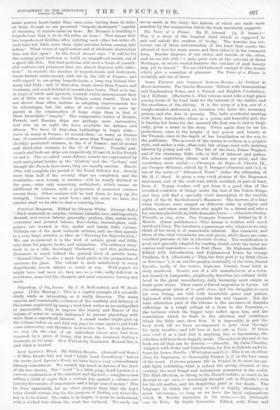Lord Lynton's Ward. By Helena Brooks. (Jerrold and Sons.) —If
Miss Brooks had not read " Little Lord Fauntleroy " before she wrote Lord Lynton's Ward, we have here a very extraordinary literary coincidence. We cannot, say much in favour of the later of the two stories. The " ward " is a little prig; Lord Lynton is a curious combination of the martinet and the fool ;—imagine a man telling a child of eight that a certain key opened a cabinet con- taining documents of importance and a large sum of money ! This he does, apparently, for no other purpose than that the boy's tutor should torture him for the purpose of finding out where the key is to be found. The tutor is in league, it must be understood, with a wicked heir whom the ward has replaced. We really can
see no merit in the story, the defects of which are made more manifest by the comparison which the book inevitably suggests.
The Voice of a Flower. By E. Gerard. (A. D. Innes.)— This is a story of the tragical kind which is supposed to
suit and satisfy the readers of to-day. The heroine has two lovers, one of them unfortunately of the kind that resists the ailment of love for many years, and then takes it in the intensest form. Murder disposes of one suitor, and suicide of the other, and we are left with " a pale, quiet nun at the convent of Saint Noslinges, on whose wasted features the remains of past beauty
may yet be traced." We are old-fashioned enough to like stories which give a sensation of pleasure. The Voice of a Eimer is certainly not one of these.


















































 Previous page
Previous page